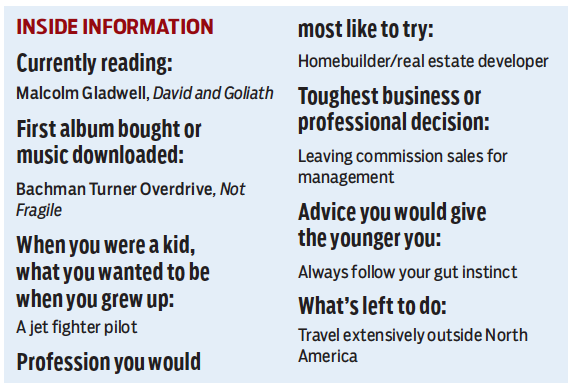Big deals, big dollars, big egos: these are what grab headlines when global capital flows roil local real estate markets.
But equally important to local markets are the small brokerages, which find themselves constantly reinventing themselves to serve clients that read the headlines and want a part of the action. While mergers offer one way to increase a firm’s reach, many prefer to affiliate with like-minded companies, a move that lets them act locally while reaching globally.
“What keeps most commercial real estate people up at night is not so much what’s happening day to day, but what are going to be the trends in the next six months to a year,” said Chris Anderson, president of Lee & Associates Commercial Real Estate (BC) Ltd. “You can’t just change your processes and policies at the flip of a switch. You have to be ahead of the game.”
Anderson knows the challenges first-hand. He joined the Vancouver office in February 2015, when it was affiliated with DTZ.
DTZ’s merger in September 2015 with Cushman & Wakefield Ltd. led the office to reinvent itself with a view to serving a growing international interest in Vancouver.
“We had a choice to make,” Anderson said. “We thought, ‘Do we go back to our roots and become independent, or do we go and try to find another brand to align ourselves with?’”
With the backing of founding partners Bob Saunders and John McIntyre (Scott Primrose joined the ownership group in 1985), Anderson looked to find a new brand for the brokerage first established as Town Group Realty Ltd. in 1970.
“Being able to have an affiliation with other commercial real estate offices in other markets is still appealing,” Anderson said. “Our clients have offices outside of Vancouver, outside of B.C. and into the U.S. and even globally, so we felt that it made more sense for us … to align ourselves with another brand.”
Lee & Associates had a culture similar to those at previous firms with which the office was aligned, one happy to let local offices have their independence while sharing the benefits of affiliation. This was the approach J.J. Barnicke of Toronto took as it expanded across Canada, before DTZ acquired it in 2007. A similar opportunity presented itself as Lee & Associates sought to expand into Canada last year.
Its office in Vancouver is a launching pad for national expansion into Calgary and Toronto, a move that promises to make good use of Anderson’s experience and connections.
“The reason I was brought in was to bring a little bit more in the way of policies and procedures and systems because I had worked at the large international commercial real estate groups,” he said of his recruitment in February 2015.
Anderson initially worked with Colliers International in Vancouver in 1989, relocating in 1998 to Calgary where he eventually shifted to Royal LePage (now Cushman & Wakefield), becoming manager of the local office in 2003.
He returned to Vancouver in 2010, spending three years as a broker before being tapped to open the local office of Marcus & Millichap in 2013.
Now, with Lee & Associates, he oversees 20 brokers and nine staff, including himself, and aims to expand the office not only to serve growing international demand, but also to equip it to understand the particular dynamics driving the growth.
“Being able to hire experienced commercial agents is difficult,” he said. It’s particularly tough, he added, for the increasingly significant groups of buyers from India, Iran and Asia who are not just investing but keen to develop here, too.
“Most agents are grown, they’re trained in the firm, so our biggest challenge is getting younger agents to join us as opposed to some of the bigger names that they see out there.”
Anderson has spent a life in sales, however, and is well aware of the challenges.
Born in 1960, he spent his youth in Riverview, New Brunswick, where his father was a sales rep working the region’s jewelry stores. When Anderson finished high school, the family headed west to Alberta. His dreams of become a commercial pilot were checked as he joined his father on the sales circuit, offering Cross pens and Citizen watches.
The recession of the early 1980s called time on that path, however.
“I was selling Cross pens in Alberta, and when interest rates were 21%, people in Wainwright, Alberta, weren’t buying Cross pens at $40 a pop,” he said. “It was a tough sell. I decided that if I was going to be into sales I should be in an industry where there was no ceiling to what I could make – and that was insurance, stock broker or real estate.”
He chose real estate. He got married and had two kids, now 23 and 19.
Meanwhile, the Lower Mainland was maturing, changing the dynamics of the real estate business.
Growth of the commercial and industrial stock that has been the office’s bread and butter for a generation has shifted to the suburbs. The industrial market in Vancouver proper has “all but disappeared,” he said, while communities that would have been an unthinkable commute when he came to Vancouver in the 1980s are now the affordable destinations.
The shift will bring further diversification and specialization among local real estate firms, Anderson said. He points to Lee & Associates affiliate Gerald Eve, which offers sales, leasing, valuations and other services in the U.K. It’s a direction he would like to see his office take, distinguishing it against some of the larger brokerages, notwithstanding the opportunities some firms have found for specializing in specific types of assets.
“Outside North America, and in many places in the U.S., commercial brokerages are set up quite differently,” he said. “I think that will come here as our markets continue to grow and mature.” •





